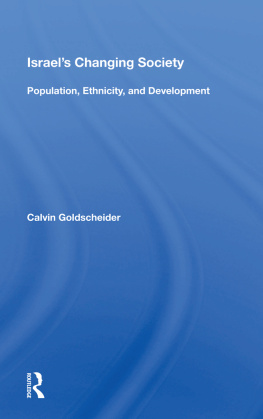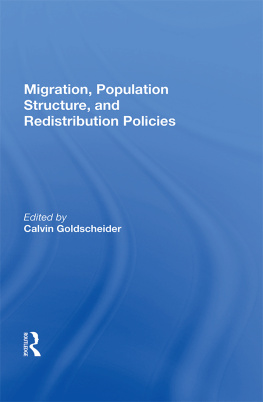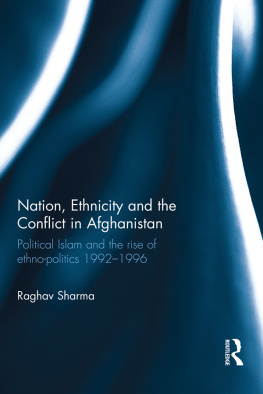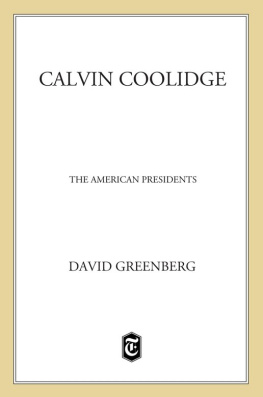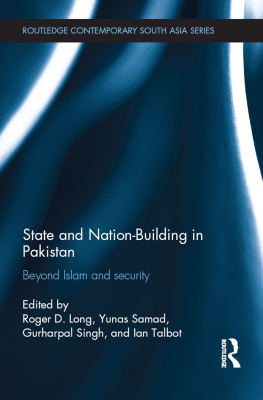Population, Ethnicity, and Nation-Building
Published in cooperation with the Population Studies and Training Center and the Watson Institute for International Studies Brown University
Brown University Studies in Population and Development
Population, Ethnicity, and Nation-Building, edited by Calvin Goldscheider
Population and Social Change in Israel, edited by Calvin Goldscheider
Migration, Population Structure, and Redistribution Policies, edited by Calvin Goldscheider
Fertility Transitions, Family Structure, and Population Policy, edited by Calvin Goldscheider
In honor of Harold W. Pfautz and Martin U. Martel In memory of Edward T. Pryor
First published 1995 by Westview Press, Inc.
Published 2019 by Routledge
52 Vanderbilt Avenue, New York, NY 10017
2 Park Square, Milton Park, Abingdon, Oxon OX14 4RN
Routledge is an imprint of the Taylor & Francis Group, an informa business
Copyright 1995 Taylor & Francis
All rights reserved. No part of this book may be reprinted or reproduced or utilised in any form or by any electronic, mechanical, or other means, now known or hereafter invented, including photocopying and recording, or in any information storage or retrieval system, without permission in writing from the publishers.
Notice:
Product or corporate names may be trademarks or registered trademarks, and are used only for identification and explanation without intent to infringe.
Library of Congress Cataloging-in-Publication Data
Population, ethnicity, and nation-building / edited by Calvin
Goldscheider.
p. cm.
Includes bibliographical references.
ISBN 0-8133-8953-4
1. National state. 2. Ethnic groupsPolitical activity.
3. Ethnic relations. 4. Demographic transition. 5. Population
geography. I. Goldscheider, Calvin.
JC311.P665 1995
321'.05dc20 95-14820
CIP
ISBN 13: 978-0-367-28389-6 (hbk)
Hardly a day passes that issues of ethnic conflict do not appear on the front pages of our newspapers, on the evening news, or in special magazine articles and television programs. Ethnic-based issues have become conspicuous in the revolutions in Eastern Europe and in the collapse of the Soviet Union. They are central to the emerging societies, economies, and politics of Asia, Africa, and the Middle East. They are continuing features of the politics of race and immigration in Western pluralistic nations decades after assimilation, economic development, political mobilization, and legislation were expected to eliminate discrimination, ethnic identification, and the salience of ethnic communities. Foreign workers and former colonial subjects have redefined the meaning of ethnic group in "homogeneous" Western countries. Ethnicity, linked to discrimination and racism, remains the source of intergenerational disadvantage and inequality in countries around the worldEast, West, North, and South.
The research reported in this volume focuses on the linkages between ethnicity and population processes in the context of nation-building. Using historical and contemporary illustrations in a variety of countries, parts of the complex puzzle are scrutinized through the prisms of history, political science, anthropology, sociology, and demography. Themes of ethnic group formation and transformation, persistence and assimilation, demographic transitions and convergences, and the processes of political mobilization and economic development are described, compared, and analyzed. The examples were carefully selected to illustrate both the diversity of contexts and the shared processes that link population dynamics, nation-building, and ethnicity. In nine research chapters, preceded by an introductory overview of themes and guidelines, a rich array of findings, insights, and new questions about ethnicity, population processes, and nation-building is presented.
with an analysis of the changing meanings of United States census data on ethnic categories. Michael White and Sharon Sassier examine data from the 1910 and 1980 censuses to study the residential and employment bases of group competition and assimilation. Taken together, the results of these comparative studies challenge past research and should generate new studies of these linkages.
These chapters originated in two workshop conferences that were held at Brown University under the auspices of the Thomas J. Watson Jr. Institute for International Studies. The workshops were organized around the global theme "North-South/East-West: Establishing a Common Agenda in an Interdependent World." The first, in 1990, was a preliminary get-together to see whether scholars from different disciplines could begin to clarify the conjunction of nation-building, population, and ethnic processes. We drew primarily from the rich resources of scholars at Brown University and we invited critical expertise from elsewhere to enhance our intellectual scope. To cover the range of disciplines we included a historian (Skidmore), anthropologist (Leis), political scientists (Zuckerman and Silver), along with sociologists and demographers (Pryor, Hirschman, Goldscheider, Ma, and White). We were joined by several graduate students in Sociology and Political Science who were participating in my graduate seminar on ethnicity.
Our goal was to unite the major disciplines that have struggled with ethnic issues in comparative contexts and to focus attention on cross-national illustrations of ethnic processes. My own biases make demographic issues a central element in the study of ethnic processes. Experts in demographic transitions in many parts of the world were included, as were others who tended to integrate population factors in their research, even if they were not experts in the field. We wanted some insights into the past and contemporary patterns of ethnicity within Europe and America (North and South), so that we could compare them to studies of Asia and Africa. We considered it a bonus to have a Latin American expert, and particularly to have scholars with special research expertise in the minorities of China and the Soviet Union. We were fortunate to have so many areas of the world covered, even as we knew that we could not cover all places and include all illustrations.
The goal of the first working group session was to examine the variety of linkages among three complex processes demographic change, ethnic group conflict, and nationalism. In the process, these themes were clarified, sharpened, and expanded to include a wide range of family and residential patterns among the demographic processes, to focus on nation-building, not nationalism, and to consider ethnicity in its broadest sense, including, where appropriate, race and religious groups. We did not limit our analysis to ethnic conflict. In two days of intense conversations, we addressed broad and abstract questions of how ethnic groups emerge in the context of nationalism (nation-building); how demographic changes (including immigration, internal migration, fertility, population growth and distribution) influence, shape, and erode ethnic distinctiveness culturally and structurally; and how these changes might be linked to ethnic assimilation and the re-definition of ethnic power and inter-ethnic conflict. We discussed how these themes are connected to global interdependence and linkages between nations; how these patterns vary between economically more and less developed states; and how changes in political contexts shape emerging patterns of ethnicity in modern nation states.




